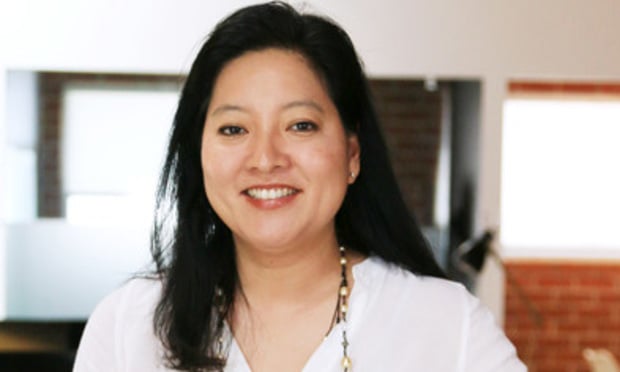Exploring Modern Horizons: Q&A with Rina Yano, Kin's VP of Business and Legal Affairs
For Rina Yano, Kin Community's vice president of business and legal affairs and sole in-house lawyer, allows her the opportunity to work in an environment that she said represents “the wave of the future.”
June 28, 2019 at 08:00 AM
3 minute read
 Rina Yano, VP for business and legal affairs at Kin Community in Los Angeles. May 30, 2019.
Rina Yano, VP for business and legal affairs at Kin Community in Los Angeles. May 30, 2019.
For more than 70 million women, Kin Community is a place to talk everything from fitness to family to food. For Rina Yano, Kin's VP of business and legal affairs and sole in-house lawyer, the lifestyle entertainment company that develops, creates and distributes content in all forms and across all platforms is the opportunity to work in an environment that she says represents “the wave of the future.” After a year as an associate in the Los Angeles office of Kelley Drye & Warren, Yano went in-house at Sony Pictures Entertainment and Warner Bros. Following an 11-year stint at The Wonderful Co., she's back in the law of entertainment, this time on the digital side. Yano spoke with Corporate Counsel reporter Kristen Rasmussen about the challenges and thrills of her job. The conversation has been edited for length and clarity.
What drew you to this interface between entertainment and digital law?
I feel like we're at a very critical point in entertainment in which people are cord-cutting and exclusively viewing their entertainment content on their laptops or their phone. It was very evident for me when my 2-year-old's main entertainment was watching YouTube channels on her iPad. At 2 years old, that was her main focus of entertainment, so I knew that there was something there.
How does it compare to your previous entertainment work?
At prior jobs, I did the same sort of licensing type arrangements, but here I am constantly being challenged by the people that I work with on extending the boundaries of what can be said online. I find it to be very exciting because I am constantly educating myself, reading up on what other attorneys have experienced and speaking to other attorneys. I'm a 20+-year lawyer now, but I'm still learning, which is very exciting. What's also fun about my job is that since we're a small company, in addition to being the lawyer, I also can speak up and discuss creative issues and suggest talent. And that opinion is very much welcome, which is a lot of fun for me.
What is your biggest challenge?
The challenge for me is working with talent from traditional media, who have to switch their mentality of working at a TV production to going to a digital production, which is completely different: Our deals are structured differently, our shows are distributed differently, and the feedback they receive is instant. It's so many different layers that a traditional talent is not accustomed to. My company has been around for 12 years, and we've been doing digital video exclusively for that time, but then to now be working with traditional talent that is not used to that environment is a challenging educational process.
How do you deal with being a woman in the male-dominated media startup industry?
There's a comfort for me only because of the company I work for, which is 80% women. But when you step outside the bounds you definitely feel the difference of being a woman and, for me, an Asian woman. I just tend to focus on what I do and what our company does in empowering female voices, so I don't let that outside world bother me as far as my day-to-day work.
This content has been archived. It is available through our partners, LexisNexis® and Bloomberg Law.
To view this content, please continue to their sites.
Not a Lexis Subscriber?
Subscribe Now
Not a Bloomberg Law Subscriber?
Subscribe Now
NOT FOR REPRINT
© 2025 ALM Global, LLC, All Rights Reserved. Request academic re-use from www.copyright.com. All other uses, submit a request to [email protected]. For more information visit Asset & Logo Licensing.
You Might Like
View All
'Incredibly Complicated'? Antitrust Litigators Identify Pros and Cons of Proposed One Agency Act
5 minute read

After Botched Landing of United Airlines Boeing 767, Unlikely Plaintiff Sues Carrier
5 minute read
Inside Track: Why Relentless Self-Promoters Need Not Apply for GC Posts
Trending Stories
- 1Uber Files RICO Suit Against Plaintiff-Side Firms Alleging Fraudulent Injury Claims
- 2The Law Firm Disrupted: Scrutinizing the Elephant More Than the Mouse
- 3Inherent Diminished Value Damages Unavailable to 3rd-Party Claimants, Court Says
- 4Pa. Defense Firm Sued by Client Over Ex-Eagles Player's $43.5M Med Mal Win
- 5Losses Mount at Morris Manning, but Departing Ex-Chair Stays Bullish About His Old Firm's Future
Who Got The Work
J. Brugh Lower of Gibbons has entered an appearance for industrial equipment supplier Devco Corporation in a pending trademark infringement lawsuit. The suit, accusing the defendant of selling knock-off Graco products, was filed Dec. 18 in New Jersey District Court by Rivkin Radler on behalf of Graco Inc. and Graco Minnesota. The case, assigned to U.S. District Judge Zahid N. Quraishi, is 3:24-cv-11294, Graco Inc. et al v. Devco Corporation.
Who Got The Work
Rebecca Maller-Stein and Kent A. Yalowitz of Arnold & Porter Kaye Scholer have entered their appearances for Hanaco Venture Capital and its executives, Lior Prosor and David Frankel, in a pending securities lawsuit. The action, filed on Dec. 24 in New York Southern District Court by Zell, Aron & Co. on behalf of Goldeneye Advisors, accuses the defendants of negligently and fraudulently managing the plaintiff's $1 million investment. The case, assigned to U.S. District Judge Vernon S. Broderick, is 1:24-cv-09918, Goldeneye Advisors, LLC v. Hanaco Venture Capital, Ltd. et al.
Who Got The Work
Attorneys from A&O Shearman has stepped in as defense counsel for Toronto-Dominion Bank and other defendants in a pending securities class action. The suit, filed Dec. 11 in New York Southern District Court by Bleichmar Fonti & Auld, accuses the defendants of concealing the bank's 'pervasive' deficiencies in regards to its compliance with the Bank Secrecy Act and the quality of its anti-money laundering controls. The case, assigned to U.S. District Judge Arun Subramanian, is 1:24-cv-09445, Gonzalez v. The Toronto-Dominion Bank et al.
Who Got The Work
Crown Castle International, a Pennsylvania company providing shared communications infrastructure, has turned to Luke D. Wolf of Gordon Rees Scully Mansukhani to fend off a pending breach-of-contract lawsuit. The court action, filed Nov. 25 in Michigan Eastern District Court by Hooper Hathaway PC on behalf of The Town Residences LLC, accuses Crown Castle of failing to transfer approximately $30,000 in utility payments from T-Mobile in breach of a roof-top lease and assignment agreement. The case, assigned to U.S. District Judge Susan K. Declercq, is 2:24-cv-13131, The Town Residences LLC v. T-Mobile US, Inc. et al.
Who Got The Work
Wilfred P. Coronato and Daniel M. Schwartz of McCarter & English have stepped in as defense counsel to Electrolux Home Products Inc. in a pending product liability lawsuit. The court action, filed Nov. 26 in New York Eastern District Court by Poulos Lopiccolo PC and Nagel Rice LLP on behalf of David Stern, alleges that the defendant's refrigerators’ drawers and shelving repeatedly break and fall apart within months after purchase. The case, assigned to U.S. District Judge Joan M. Azrack, is 2:24-cv-08204, Stern v. Electrolux Home Products, Inc.
Featured Firms
Law Offices of Gary Martin Hays & Associates, P.C.
(470) 294-1674
Law Offices of Mark E. Salomone
(857) 444-6468
Smith & Hassler
(713) 739-1250






